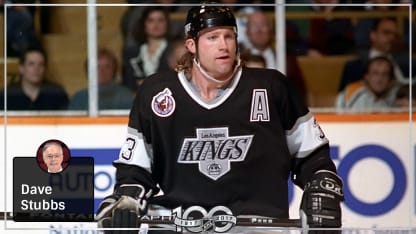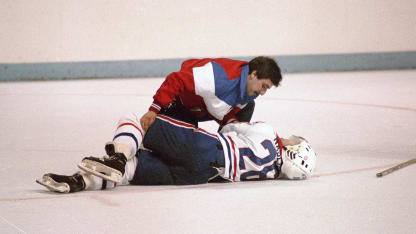"I can guarantee you the Kings' rack wasn't in our room," said Lefebvre, who some to this day swear that he had secretly scoped the Kings sticks. "I don't recall anybody measuring sticks, and I'm not trying to cover anyone's rear end almost 25 years later.
"Here's what I remember: I'd be on our bench during warm-up -- both teams' benches were on the same side in the Montreal Forum -- and I'd look at the other team to see who was skating well or coming back from injury, taking notes for Jacques [Demers]. A few people noticed that McSorley had a pretty open blade, to say the least.
"I know (Canadiens center) Guy Carbonneau had a great eye for eyeballing a stick, leaning over on a faceoff. So we're down 2-1 and I remember Jacques leaning over to Carbonneau to ask, 'Should we call it?' I don't remember what Carbonneau said, but Jacques said something to me like, 'I'm not 100 percent sure that the stick is illegal.' Just to relax him, as a joke, I said, 'Jacques, here's all I'm sure of: I'll die one day and I have to pay income tax this year.' "
McSorley maintained in his 2012 talk with Gallagher that the Canadiens had measured the Kings' sticks beforehand.
"They knew who was using an illegal stick before they made the call because they'd measured our sticks," McSorley said. "There must have been five of us who had them because it was never called by anybody. They just picked me because I killed all the penalties. …
"Was I using an illegal stick? Yes, I was, but it's not as if I took a torch to it. They came from the factory that way. I used the same stick in the next game and tied Game 4 with what might have been the same stick."
Indeed, before Game 3 in Los Angeles, then-Calgary Herald writer Eric Duhatschek measured a new batch of McSorley's Christian USA sticks, with the player's permission, and discovered that they all needed to be blowtorched and bent into a legal curvature.



















